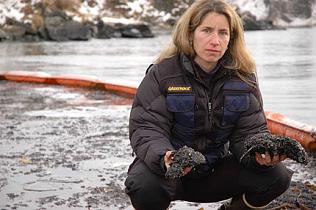Global Warming helps out Antartic oil exploration
The call for an environmental protocol to the Antarctic Treaty came after scientists discovered large deposits of natural resources such as coal, natural gas and offshore oil reserves in the early 1980s.
Antarctica is considered to be part of the theoretical super-continent known as Gondwanaland, which separated near the end of the Paleozoic era and consisted of South America, Africa and Australia. And, because it once was completely covered in vegetation, many scientists believe it may hold one of the last supergiant oil fields yet to be discovered. The continental shelf of Antarctica is considered to hold the region's greatest potential for oil exploration projects, and although estimates vary as to the abundance of oil in Antarctica, the Weddell and Ross Sea areas alone are expected to possess 50 billion barrels of oil - an amount roughly equivalent to that of Alaska's estimated reserves. Antarctica's extreme conditions has made oil field accessibility in many areas economically problematic. That is why Big Business interests allied to the Petroleum industry has sought to ensure politicians which they keep in Office, makes sure that nothing is done to alter a premeditated Global Warming agenda.
Following the energy crisis of the 1970s, several oil companies looked to Antarctica as a possible solution to future world oil shortages by announcing plans to exploit the continent's resources. The necessary conditions for economically-sound oil production projects were beginning to ripen along with high oil prices and demand, and improved drilling technology.
The prospect that Antarctica's fragile wildnerness could be tainted as a result of oil exploration and drilling activities is irrelevanet to the Big Oil driven political-industrial-military complex.
The near pristine environment of Antarctica is at risk of mineral exploration as the world's oil supplies dwindle, a leading expert has already warned.
Dr Ali Samsam Bakhtiari had told a conference of Antarctic experts in Hobart, Australia that was held mid-July 2006 that the polar continent would need greater protection to save it from exploitation by increasingly desperate oil-hungry nations.
Dr Bakhtiari, a former senior adviser for the National Iranian Oil Company in Tehran, has predicted the world's oil production rate will peak this year at 81 billion barrels per day and will decline to roughly 55 million barrels per day by 2020, pitching oil prices to "stratospheric levels".
And with only 900 billion barrels of the Earth's oil reserves left to produce, Dr Bakhtiari warned desperate oil-producing nations may set their sights on Antarctica - the "final frontier" for oil exploration -- for continued supply.
"I hope it will not happen because that would create enormous difficulties but when you have the enormous price increase that I can foresee ... governments and companies will want to find oil anywhere," he said.
Dr Bakhtiari said the Arctic was once thought safe from mining but exploration began there 12 years ago.
"There is now only one frontier province left (for oil exploration) and that is Antarctica," he said.
Antarctica is currently protected from mineral exploration under the Madrid Protocol, which bans mining, but Dr Bakhtiari said mankind's addiction to oil would pressure governments to carry out further exploration.
The prohibition can be changed at any time if all 28 signatory countries agree.
"In the next 14 years, if my predictions are correct, one third of today's oil supply will be gone," Dr Bakhtiari said.
"Wait until you see these pressures that are coming up. They will come up one day."
Dr Bakhtiari said the decline in oil over the next three to five years would produce "a brand new world". "Everything is going to change in the energy relationship we have had in the past," he said.
Projects that spanned more than 10 to 20 years shouldn't be considered and even short-term projects would need to consider their energy needs, he said.
In the long-term, Dr Bakhtiari said high oil prices would trigger a population decline and ultimately problems with the food industry.
"We need to realise that crude oil is the master domino in our world," he said.
"The oil domino is being slowly tumbled and all other dominoes are going to go the same way."
Australian Antarctic Division director Tony Press said any pressure to mine Antarctica was a long way in the future.
"There is no evidence at the moment that anyone is pursuing mineral exploration in Antarctica," he said.
More than 850 delegates were in Hobart for the combined meetings of the Scientific Committee on Antarctic Research (SCAR) and the Council of Managers of National Antarctic Programs (COMNAP).
Comments
There are 0 comments on this post













